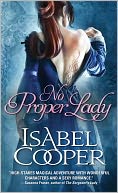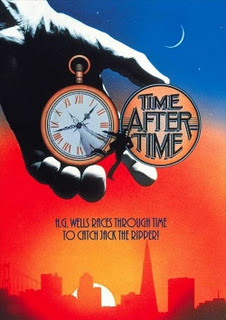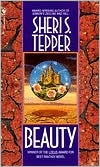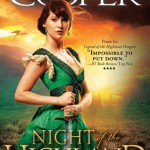 No Proper Lady by Isabel Cooper appeared on a number of “best romance of 2011” lists, including Publishers Weekly, Library Journal and RT Book Reviews Seal of Excellence and Finalist for Best Book of the Year. It had been on my TBR list for a while. I was reminded of it last week when The Galaxy Express reviewed the movie Time After Time, because both No Proper Lady and Time After Time are time travel stories, and I wondered how much they would resemble each other.
No Proper Lady by Isabel Cooper appeared on a number of “best romance of 2011” lists, including Publishers Weekly, Library Journal and RT Book Reviews Seal of Excellence and Finalist for Best Book of the Year. It had been on my TBR list for a while. I was reminded of it last week when The Galaxy Express reviewed the movie Time After Time, because both No Proper Lady and Time After Time are time travel stories, and I wondered how much they would resemble each other.
 First, if you haven’t seen Time After Time, stream it on Netflix or Amazon. Then come back. I’ll wait. Malcolm McDowell as H.G. Wells takes his quite functional time-machine from Victorian London to San Francisco in 1979 in pursuit of his former BFF Dr. John Stevenson (played chillingly well by David Warner) who HG has just (in 1893) discovered is Jack the Ripper, just after Stevenson “borrows” his time machine. HG follows Stevenson to the future to bring “the Ripper” back to face justice. Wells is much more of a “fish out of water” in the late 20th century than the violent Ripper. The veneer of civilization had changed in nearly a century, but violence is the same. Wells finds a guide to help him navigate the 20th century, and true love makes all things bearable, even though it provides him a hostage to fortune.
First, if you haven’t seen Time After Time, stream it on Netflix or Amazon. Then come back. I’ll wait. Malcolm McDowell as H.G. Wells takes his quite functional time-machine from Victorian London to San Francisco in 1979 in pursuit of his former BFF Dr. John Stevenson (played chillingly well by David Warner) who HG has just (in 1893) discovered is Jack the Ripper, just after Stevenson “borrows” his time machine. HG follows Stevenson to the future to bring “the Ripper” back to face justice. Wells is much more of a “fish out of water” in the late 20th century than the violent Ripper. The veneer of civilization had changed in nearly a century, but violence is the same. Wells finds a guide to help him navigate the 20th century, and true love makes all things bearable, even though it provides him a hostage to fortune.
No Proper Lady has elements of both Time After Time and Sheri S. Tepper’s Beauty. The comparison to Beauty is good but frightening. We’ll come back to that one. There’s even more than a hint of the Terminator if you squint.
Joan has been sent back to 1888 to change history. In the future that she comes from, humanity is about to be exterminated, and the events that lead to its demise happen in 1888. When Joan comes from, the demons have destroyed nearly everything, and the humans they do not control are almost gone. One last ceremony, one final burst of energy, sends Joan back in time. The circle was breached even as she was being sent through it.
But even if she didn’t feel the others fall, Joan can never go back. If she succeeds, she changes the future for the better. Her future will never happen, and good riddance. But the people she knew, her parents, her friends, will never be born. She is utterly alone in a totally foreign world, two hundred years in the past.
All she has is a name. She has to stop Alex Reynell and destroy the book of demon summoning spells that he has written. Now. In this year 1888 that she has been sent to. Or the human race is doomed.
Joan, like H.G. Wells, finds a contemporary guide. Her guide is Simon Grenville. He, too has a problem with Alex Reynell. Simon and Alex used to be best friends, until Alex took the magic powers that they were both learning and started summoning demons. Now they are enemies. Simon and Joan become allies in the fight to save humanity.
But first, they have to find a way to introduce a woman who has spent her entire life fighting tooth and nail for her very survival into the upper crust of Victorian society at the height of its fussiness.
Joan discovers that learning to kill demons was much easier than learning etiquette. Which she has to learn. Because she needs to sneak up on Alex Reynell and steal that book. Destroying the book is paramount, and it must be found, no matter the cost. Her life, her heart, her soul. Or Simon’s.
Escape Rating A-: The story grabbed me on multiple levels. The fish-out-of-water time travel story is very reminiscent of Time After Time and even Diana Gabaldon’s Outlander a tiny bit, although Joan is much less sure of herself than Claire, and it is one of the things that makes her interesting as a character. One way in which No Proper Lady reminds me of Outlander is that the romance does not need to be seen as the primary motivator for the story. There is an HEA, but that’s not necessarily the only reason this story exists.
 I said this reminded me of Sheri Tepper’s Beauty. One piece of that story that still chills me is the portrait of the mid-20th century as the “last good time” on Earth. Whether one agrees or disagrees, the word-picture sticks. No Proper Lady, with Joan’s intense reactions to the pastoral beauty and plenty of the English countryside and relatively safe living conditions after her horrific experiences, evoked that same response. To her, the late 1880’s had been the “last good time” before Reynell “broke the world”.
I said this reminded me of Sheri Tepper’s Beauty. One piece of that story that still chills me is the portrait of the mid-20th century as the “last good time” on Earth. Whether one agrees or disagrees, the word-picture sticks. No Proper Lady, with Joan’s intense reactions to the pastoral beauty and plenty of the English countryside and relatively safe living conditions after her horrific experiences, evoked that same response. To her, the late 1880’s had been the “last good time” before Reynell “broke the world”.
No Proper Lady is absolutely not a typical romance novel. And that’s the beauty and the wonder of it.






